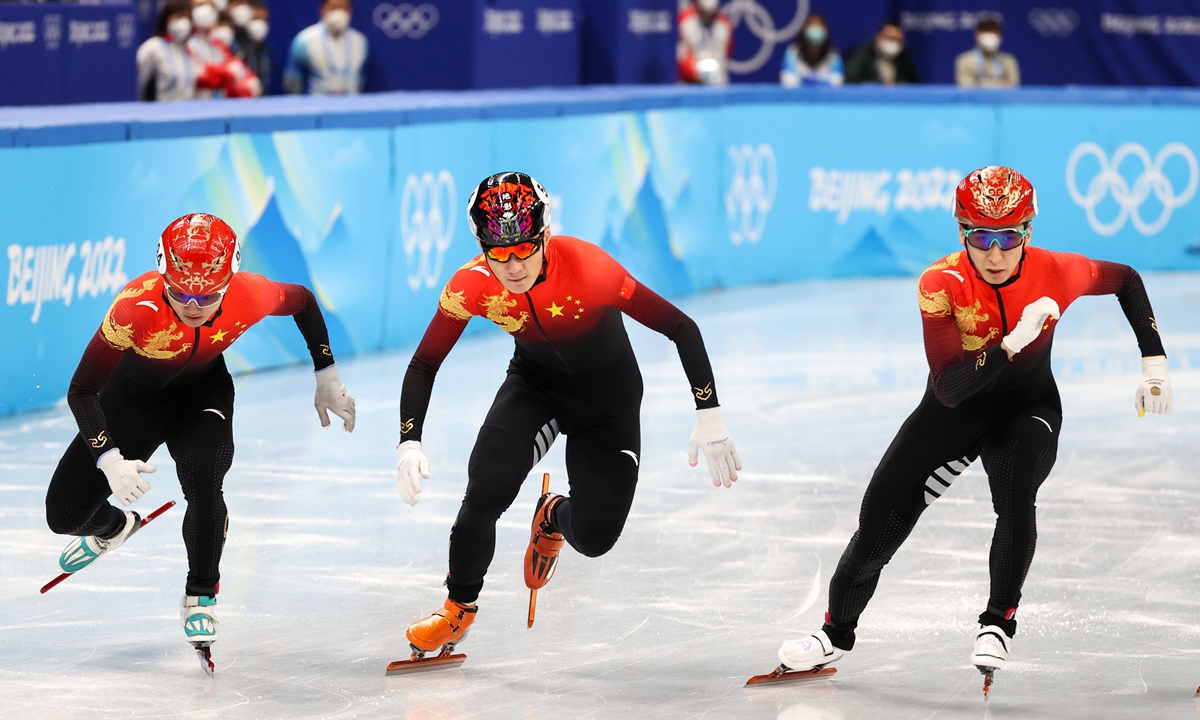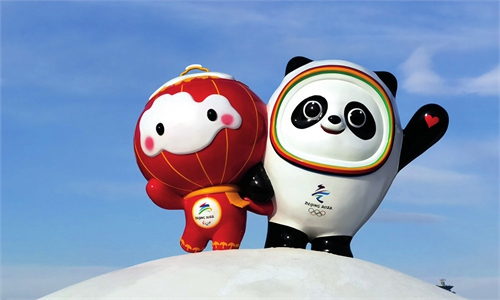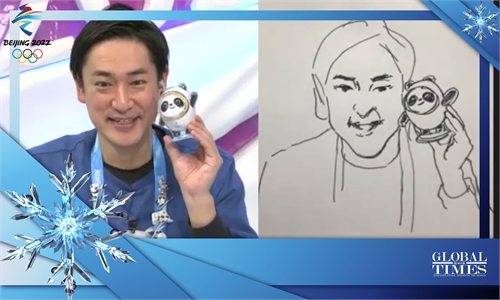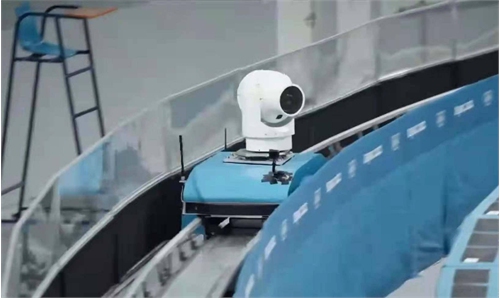Principle of playing within rules underscored as SK hypes speed skate penalty
Friendship, sportsmanship among Chinese skaters hailed after historic gold

Chinese athletes Wu Dajing, Ren Ziwei and Li Wenlong of China compete in a men's final 1,000m short track speed skating race at the Capital Indoor Stadium as part of the 2022 Winter Olympic Games.Photo:IC
The basic principle for competition is to play within the rules, Chinese experts and netizens said while call for respect to sportsmanship and rules as some South Korean netizens and politicians keep hyping controversy over the penalties on their athletes in the semi-final for the men's speed skating of the Beijing 2022 Winter Olympic Games even after the International Skating Union (ISU) rejected their protest.
South Korean skaters Hwang Daeheon and Lee June-seo were disqualified for making an illegal late pass and lane change, respectively, in the semifinals on Monday night, over which the South Korean team had protested to the ISU, but was promptly rejected. The head of the South Korean delegation Yoon Hong-geun said Tuesday at a press conference in Beijing that he had requested a meeting with the world's Olympic chief over the issue and would continue to appeal with the Court of Arbitration for Sport.
The issue soon ignites a cyber-quarreling on South Korean social media platform with many Korean neztiens flooding to the social media platform of Chinese speed skater Wu Dajing and that of former South Korean team member and current coach for Chinese team Viktor Ahn Hyun-soo, as well as Ahn's families, to attack and curse them.
Some netizens and politicians even asked the South Korean to withdraw from the Beijing Games, which Yoon said would not be "the best course of action at this juncture" as the team "has a lot of Olympics still left here."
In quick response, Chinese netizens dashed to Wu and Ahn's social media accounts to leave encouraging comments with Chinese national flags to protect the athletes who fought for China.
Some Chinese netizens also released screenshots and diagrams to clearly illustrate how and why Hwang deserved the penalty.
The ISU on Monday rejected a protest from the South Korean team, reiterating that, as announced on the video screen in the arena, Hwang got the penalty for an "illegal late pass causing contact."
The penalties should no longer be viewed as controversial, as the two teams have already appealed to the ISU, which holds the top authority on rulings, Wang Chunlu, former short track speed skating world champion, told the Global Times on Tuesday.
"The rules of short track speed skating state that the referees' ruling on court is final," Wang explained, pointing out that the penalized teams can appeal to the ISU within half an hour after the competition ends and the ISU will study the calls, but the result will stand.
Wang said all the Chinese short track athletes performed excellently and deserve their medals.
After the ISU changed the rules of short track speed skating after the Pyeongchang Winter Olympics, the dangerous technique of inside-out passing was greatly restricted, Ren Hai, an Olympic sports expert, told the Global Times, noting that many athletes are still in the process of adapting to the new rules.
While Ren noted that, on a technical level, China and South Korea are still close in terms of short track speed skating, Chinese netizens noted that the South Korean team is famous for a history of disturbing others aggressively during competitions, not just limited to the Monday test or against the Chinese team.
In contrast, they were touched and spoke highly of the friendship between Wu and his teammate, the newest 1,000m champion Ren Ziwei. During the 1,000m final on Monday night, Wu touched Ren's hand and told him to go ahead when Wu felt tired and could not keep up with Ren, saying that this is real sportsmanship that should be respected.
"When Chinese athletes compete in the same test, they ask teammates to go first; when South Korean athletes compete in the same test, they shove athletes from other teams," Chinese netizens said.
"Chinese and South Korean athletes may have different styles of competition due to their respective cultures and environments," Ren Hai said. "Everyone may have a different style of competition. Some are more aggressive and some are more humble. But as long as it's within the rules, we can accept all styles of play."




